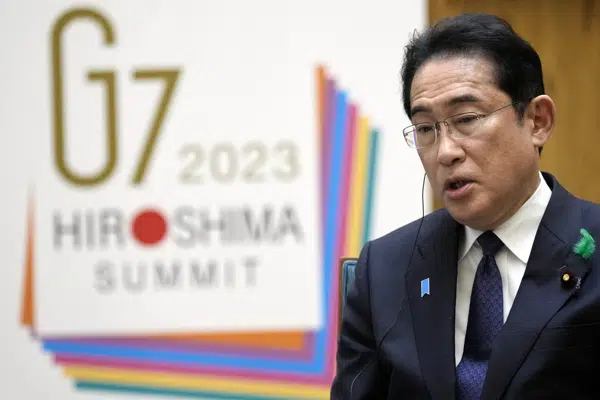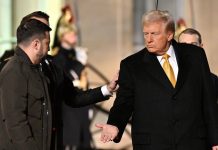TOKYO (AP) — This week’s summit of the Group of Seven wealthy democracies in Hiroshima will include eight other guest nations, part of a complicated, high-stakes diplomatic gambit meant to settle the world’s most serious crises.
Japanese Prime Minister Fumio Kishida has invited South Korea, Australia, India, Brazil, Vietnam, Indonesia, Comoros and the Cook Islands.
Kishida hopes this mix of countries will help efforts to stand up to China’s assertiveness and Russia’s invasion of Ukraine, according to analysts. He also wants stronger ties with U.S. allies and with developing nations and to make progress on working toward a nuclear-free world, something that looks increasingly difficult amid North Korean and Russian nuclear threats.
Here’s a look at what to expect as the rich world leaders welcome these guest countries.
As their top diplomats did last month in a meeting in Nagano, Japan, the leaders of the G-7 nations — the United States, Japan, the United Kingdom, France, Germany, Canada, Italy and the European Union — will try to form a unified front against Chinese threats to Taiwan and Russia’s war on Ukraine. “The G-7 is committed to maintaining the international order and most of its members are in Europe, so helping Ukraine against Russian aggression is a top priority,” said a professor at Ewha University in Seoul.
India is part of a quad group of four Indo-Pacific countries including the United States, Japan and Australia. China accused the group of representing an “Asian NATO”. In the Russo-Ukrainian war, India repeatedly abstained from voting on UN resolutions against Russia, despite stressing the need for diplomacy to end the war.
Brazil is a member of the so-called BRICS group of developing countries which includes China, Russia and India. Brazilian President Luis Inacio Lula da Silva recently visited China to strengthen ties with the country’s largest trading market. He has also angered Ukraine and some Western countries with his own positions on the war, most recently suggesting that Ukraine should cede Crimea for peace.
Kim Yeol-soo, an expert at South Korea’s Korea Military Research Institute, said Japan is in favor of Vietnam because it also has a territorial dispute with China.
Kishida said his own host list reflects the importance of the so-called “global South” countries. It is a term that refers to developing countries in Asia, Africa and Latin America. G7 countries account for about 40% of global economic activity, down from an estimated 80% of global GDP in the 1970s.
“When the United Nations passes a resolution, we find that a significant number of its roughly 190 member states are in the ‘global South,'” said Eun-mi Choi, a Japan expert at the Asan Institute of Policy Studies in Korea. speaks.
For example, Kim said Indonesia’s importance to Japan is related to its rich natural resources and economic potential.
India holds the G20 Presidency this year and is seen as an important bridge between the G7 countries and the global South. Japan has traditionally had close ties with India, and Kishida attended a summit meeting with Indian Prime Minister Narendra Modi in March. Responding to questions from the Associated Press, Japan’s Ministry of Foreign Affairs said the G7 and other countries should work with the Global South to address issues of energy, food security, climate change, health and development.
Japan’s invitation to South Korea reflects the role of its neighbors as loyal allies of the United States in the face of the common security threat posed by North Korea’s nuclear weapons development.
In recent weeks, Kishida and South Korean President Yoon Seok-yeol have taken important steps to strengthen security and economic cooperation and overcome historical grievances.






